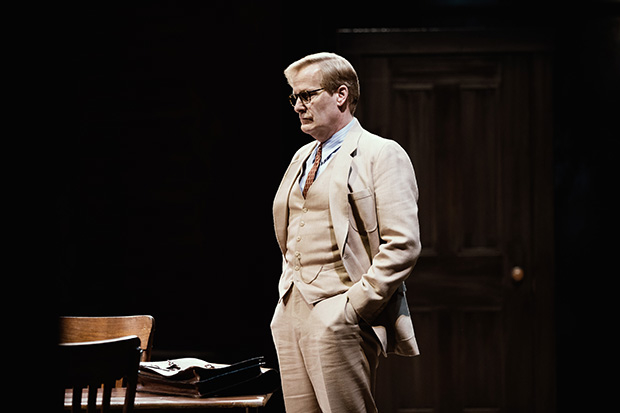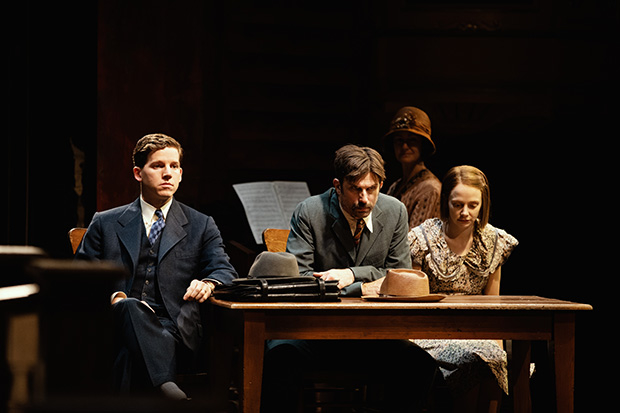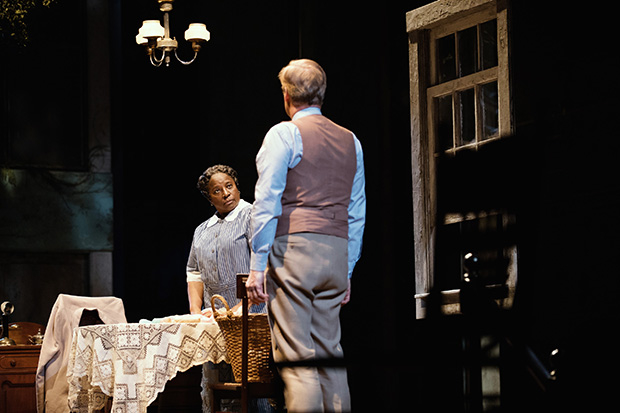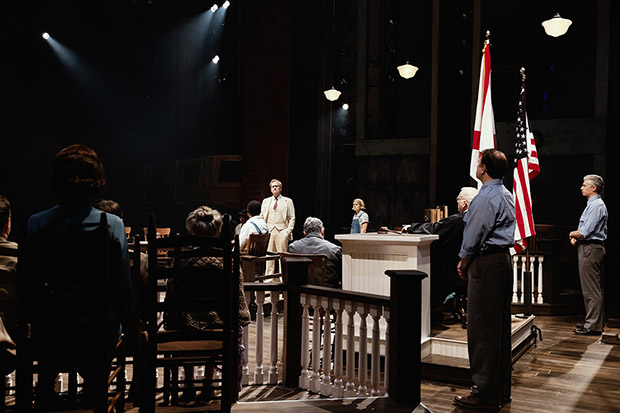Aaron Sorkin's To Kill a Mockingbird Flies Into Broadway on a Gust of Hot Air

(© Julieta Cervantes)
There are few sounds more chilling than an audience of 1,400 applauding and laughing about the cover-up of a murder. Yet that's what you'll hear if you stick around for all two hours and 35 minutes of To Kill a Mockingbird at Broadway's Shubert Theatre. Adapted from Harper Lee's 1960 novel (found on every high school English syllabus from here to Honolulu), it has a new script by Aaron Sorkin, he of the walk-and-talk bombast of such popular television shows as The West Wing and The Newsroom. His distinctive dramatic voice rings out over the boards of the Shubert, so much so that it often feels like he's talking over Lee's quietly pointed story. Thankfully, we still hear her in the character of Scout Finch, portrayed with courage and superhuman empathy by Celia Keenan-Bolger.
At the top of the show she looks at the audience and questions the official narrative that Bob Ewell (Frederick Weller) "fell on his knife." She, her brother Jem (Will Pullen), and their friend Dill (Gideon Glick) reconstruct the events that led up to his death, back when they were kids in Maycomb, Alabama, circa 1934. That summer, Ewell accused Tom Robinson (Gbenga Akinnagbe) of raping his daughter, Mayella (Erin Wilhelmi). Robinson is black and the Ewells are lower-class whites. In the hierarchy of the Jim Crow South, that gives them the clear advantage in front of a jury of their (all-white) peers. That's why Judge Taylor (an optimistically cynical Dakin Matthews) recruits Atticus Finch (Jeff Daniels), "the most honest and decent person in Maycomb," to defend Robinson. This infuriates Ewell, who seeks revenge against Finch and his family.

(© Julieta Cervantes)
Sorkin emphasizes the humiliation that drives the Ewells. They specifically resent Atticus and his perceived mockery. The political parallels to today are obvious in this story about a white professional defending a black man against the racist aggression of poor whites. Bob Ewell is particularly blunt in his condemnation of Atticus as a "race traitor," speculating that he must have some "Hebraic" blood in him (such rhetoric is depressingly timely in both 1934 and 2018). Sorkin and director Bartlett Sher never show us the Ewells' hovel by the town dump, and they scrupulously ensure that Daniels is stony-faced whenever the Ewells melt down. The message is clear: Ewell's rage is founded in nothing but paranoia and malice.
This leaves Weller little to work with, and he understandably delivers a panto baddie. Wilhelmi is more convincingly human as Mayella, whose testimony is reminiscent of watching someone flail down a rushing river: She is a survivor of sexual assault (perpetrated by whom is a matter of violent disagreement, but not that it happened). She is convinced that the "fine gentlemen" of the jury don't care to believe or protect her. And we the jurors in the audience know that she's lying. Situated at the precarious intersection of Black Lives Matter and #MeToo, this story should feel dangerous and vital. The fact that it comes off as neither is an indictment of the playwright.

(© Julieta Cervantes)
This is doubly disappointing since Sorkin and Sher have cast adult actors in the roles of the three children. This is a memory play, allowing Scout, Jem, and Dill to walk around the courtroom scenes, inspecting them like visitors to a museum. Set designer Miriam Buether imagines this receptacle of memory as an abandoned warehouse with vines creeping in through broken windows. It is beautiful but never activated by Sher's blocking, which relies on moving flats downstage. The muted colors of Ann Roth's period costumes take on a sepia quality under Jennifer Tipton's gentle incandescent lighting. Adam Guettel's dreamy, vaguely nostalgic incidental music seems to invite reflection on the past, yet shockingly little of that takes place among the three narrators.
Pullen is furtive in an underwritten role, while Glick is innocuously charming in an overwritten one. In a departure from the aristocratic Gregory Peck (who played Atticus in the 1962 film), Daniels does indeed feel like an "edgy sitcom dad," especially when he dryly threatens to cut off the children's food supply. His blood only ever seems to rise above reptilian temperatures when he is tangling with Calpurnia, the family maid. LaTanya Richardson Jackson brings plausibility to lines that feel like 2018 hindsight creeping back to judge a 1960 plot. It makes one wish we could have seen her in the A.M.E. church scene (excised here). Akinnagbe gives a sweaty, sympathetic performance as Tom, whose cross-examination is more nerve-racking than watching a tightrope act.

(© Julieta Cervantes)
Sorkin's choice to focus primarily on the trial leaves little room for Scout's rebellion against the expectations of her class and sex (gone is snooty Aunt Alexandra and her horrific tea party). Still, Scout's singularity comes through in the breathtaking performance of Celia Keenan-Bolger, an actor as intuitive as the character she plays. Her big eyes see all, absorbing the past with starling perspicacity. "I wondered if anybody had ever called her 'ma'am' or 'Miss Mayella' in her life," she responds when Mayella assumes that Atticus's "ma'am"s are a velvet-gloved smack. In the most moving scene of the play, Scout disperses a lynch mob simply by recognizing one of her neighbors under his hood and daring to call him by his name. Her acknowledgement of their shared humanity in such a fraught moment feels downright revolutionary — a glimmer of light in an otherwise dim adaptation.










